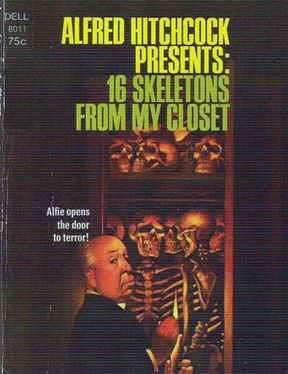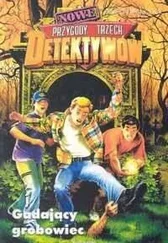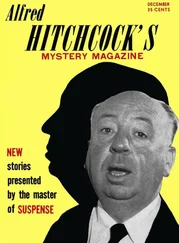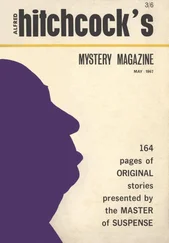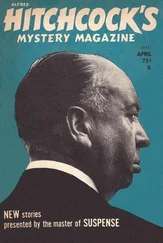"What's your name, sonny?" he said.
"William Peyton Hausler," the boy said.
It was obvious that he was stating his name fully in an attempt to secure a status, however limited by his minority, that would establish his innocence and insure the respectful treatment to which he was entitled.
"You live around here?"
"On the street over there, the other side of the golf course." He gestured with the hand holding the rod and reel to indicate the direction.
"Looks like you're going fishing."
"Yes, sir. In the lake."
"You fish here often?"
"Pretty often. The manager of the club said it was all right."
"It doesn't look like much of a lake. Any fish in it?"
"It's stocked. Crappie and bass, mostly. Club members fish in it. I'm not a member — my dad isn't — but the manager said it was all right for me to fish."
"What time was it when you found the body?"
"I don't know exactly. It hadn't been light long. About six-thirty, I guess. I wanted to get to the lake early because the fish bite better then."
"That's what I hear. Early morning and late evening. What'd you do when you found the body?"
"Nothing much. I walked up close to it, and I spoke a couple of times to see if there'd be any answer, but there wasn't, and I was pretty scared because I could tell something was wrong, and just then Mr. Tompkins came along."
"You touch anything at all?"
"No, sir. Not a thing."
"Who's Mr. Tompkins?"
"This is him. He's one of the caretakers."
"Okay. Thanks, sonny. You better go and see if you can still catch some fish."
The boy went on down the gentle slope to the little lake, and Marcus turned to Tompkins, who was a leathery-looking man who appeared to be in his sixties. He was dressed in faded twill pants and a blue work shirt of heavy material like the ones that Marcus had worn with roomy bib overalls as a kid.
"Is that right?" Marcus said. "What the kid told me?"
"I guess so. Far as I know. When I got here, he was just standing and staring at the body. He looked scared."
"No wonder. Kids don't find a body every day. What'd you do?"
"I looked at the body, not touching it, and I could see a little blood where it had seeped out in the grass. I told the kid to stay and watch things while I hustled up to the Club House to call the police."
"The Club House open that early in the morning?"
"No. There's a phone booth on the back terrace. I happened to have a dime."
"Lucky you did. I usually don't. After you called the police, did you come back here and wait?"
"That's right. Just came back and waited with the kid and didn't bother anything."
"Good. You did just right. I don't suppose you know this guy?"
"The dead man, you mean? I never saw him before."
"All right. You might as well go on to work." Marcus turned away to a uniform. "You go up to the Club House and bring the manager down here. You can tell him what's happened if he's curious."
The caretaker and the policeman went off in different directions, one toward the Club House and the other, presumably, toward whatever building sheltered the equipment for taking care, and Marcus began to prowl slowly the area around the body. He wasn't looking for anything in particular, just anything he could find, and he found nothing. No significant marks in the clipped grass growing from hard earth. No small item conveniently dropped that might later point to a place or person. Not even, he thought bitterly, a lousy cigarette butt.
The brown jacket bothered him. Why the hell had the dead man taken it off? Before he was dead, of course. And why had he left it lying on the ground five yards or so from where he had walked to be killed? Unless he had been moved after being killed, which didn't seem probable. And why, for that matter, had he been here on the golf course at all? A golf course did not seem to Marcus to be a likely place to be in the hours between midnight and dawn, sometime between, but then a golf course did not seem to Marcus a likely place to be at any time whatever, unless you came, like the kid, to fish in a lake or to lie on the grass under a tree and wish that you were something besides what you had become.
Fuller, watching Marcus, was tempted to ask him what he was looking for, but he resisted the temptation. Anyhow, quite correctly, he guessed that Marcus didn't know himself, and he was determined to avoid giving, in front of the uniform, the impression of a dumb cop appealing to his superior for enlightenment. Marcus was already, in Fuller's opinion, sufficiently overrated at headquarters. As it turned out, after a few minutes, the appeal went the other way, but it was no triumph for Fuller, after all, for it only forced him to admit what he had hoped to conceal.
"Any ideas, Fuller?" Marcus said.
"Not yet," Fuller said. "I've been trying to figure it."
"So have I, but I haven't had any luck, and I doubt if I ever do. As I see it, a guy who got himself shot on a golf course must have been crazy, and crazy people make the worst kind of murder victims from a cop's point of view because it's almost impossible to figure logically why they did what they did that got them killed."
Sure, Fuller thought. Read me a lecture about it, you topnotch snob. The Psychology of Nuts by Dr. Joseph Marcus.
He was saved from making a reply by the return of the other uniform and a small man in Bermuda shorts and heavy ribbed stockings that reached almost to his knees. Marcus approved of the shorts, for he was always one for keeping comfortable, but he was damned if he could understand why anyone would deliberately qualify the effect of the shorts by wearing the stockings. Which was, however, he conceded, none of his business.
"You the manager of this club?" Marcus said.
"Yes," the small man said. "Paul Iverson."
"I'm Lieutenant Joseph Marcus, Mr. Iverson. We've got a body here."
"Yes, yes. I know. The officer told me."
"He was shot."
"It's incredible. I can hardly believe it."
"It looks like someone took advantage of the privacy of your golf course to commit a murder."
Iverson's expression, although indicating shock and a shade of nausea, was primarily one of resentment. Among the activities of the club, he palpably felt, one expected and accepted certain indiscretions and transgressions of the peccadillo type, but murder was neither expected nor acceptable and ought to cause someone to lose his membership.
"Are you certain that it's murder?" he said. "Perhaps he killed himself."
"With his finger, maybe?"
"Oh, I see. There's no gun."
"Right. No gun. Besides, there's no powder marks on his shirt. He was shot from a distance."
"Do you think it could have been an accident of some sort?"
"It could have been, but I don't think so."
"Well, it's a terrible thing. Simply terrible. I can't understand it at all."
"You're luckier than me. You don't have to understand it. All you have to do is see if you recognize the body."
Iverson hesitated, then walked over to the body and looked intently for a moment into blind blue eyes. When he straightened and turned back to Marcus, the shade of nausea in his face had deepened, but there was also a new element of relief, as if the worst, which had been anticipated, had not developed.
"I don't know him," he said. "I can assure you that he was not a member of this club."
"Well, that's all right," Marcus said with an unworthy feeling of spite. "Maybe the murderer is."
"I believe you'll find that he is not. I find it inconceivable that a member of this club should be involved in anything like this. It will create a dreadful fuss, I'm afraid, as it is. We may have some withdrawals."
"Are you positive this man was not a member? His name was Alexander Gray."
Читать дальше
